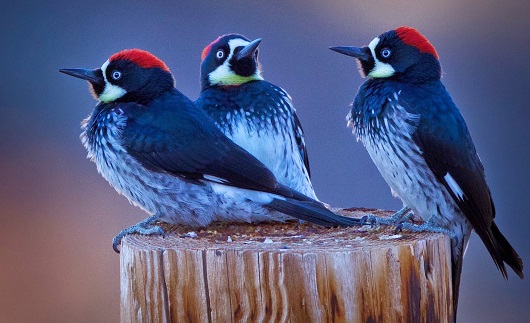Woody Woodpecker laughs in the face of politics

New research from the University of St Andrews has sparked debate about what it takes to live in stable, long-lasting social groups.
Investigation of the brain-size of woodpeckers, which often live in stable social groups, has revealed that the brains of social species are smaller than would be expected of individuals required to deal with the politics of social living: social competition, manipulation and deception.
Researchers conclude the birds are so successful at supportive community living that they have been able to disinvest in brain tissue, challenging social brain theory as we know it.
Professor Richard Byrne explains: “It’s been known for many years now that animals like primates, and several other kinds of mammal, have larger brains in species that live long-term in social groups: other things being equal, the larger the typical size of their groups, the larger the brain. That correlation supports the ‘Machiavellian intelligence’ or ‘social brain’ theory, which identifies dealing with other individuals as one of the most challenging mental problems for animals.”
Group living may be important for survival – monkeys, for instance, live in groups to reduce the risk of predation – but it presents challenges. Group members inevitably compete for resources, including food and mating, and being smart helps.
It now seems birds may be the exception to this rule. Natalia Fedorova used a summer internship in the School of Psychology to test whether social brain theory holds in stable communities of birds.
“I went to the London Museum of Natural History,” Fedorova describes, “and measured the size of the brain cavity in preserved specimens of dozens of different species. Then we categorized their social system, based on a survey of the literature, as solitary, pair-living or group-living.”
Professor Byrne continues: “Picking out a genuine effect is tricky; because body size also affects brain size, and because closely related species may be similar just because they are related. So we needed to use powerful modern statistics. We turned to Dr Cara Evans, at that time in the School of Biology, who supervised all the analyses and their interpretation.”
The trio have now published their findings in Royal Society journal Biology Letters.
Remarkably, they found the opposite of what social brain theory would predict: the group-living woodpeckers had the smallest brains, and whether or not pairs lived together over years or associated only in the brief mating system made no difference to brain size. The researchers conclude that long-term social groups in birds must be socially quite different to those of mammals, where competition is an intrinsic part of the background.
Image captions
News page: thumbnail image of Woody Woodpecker © Flickr user cactusbeetroot
This page: photo of Acorn Woodpeckers, Summerhaven, AZ © Allan Block
Background
Natalia Fedorova, Cara L Evans & Richard W Byrne (in press) ‘Living in stable social groups is associated with reduced brain size in woodpeckers (Picidae)’ Biology Letters, 20170008.
Category Research